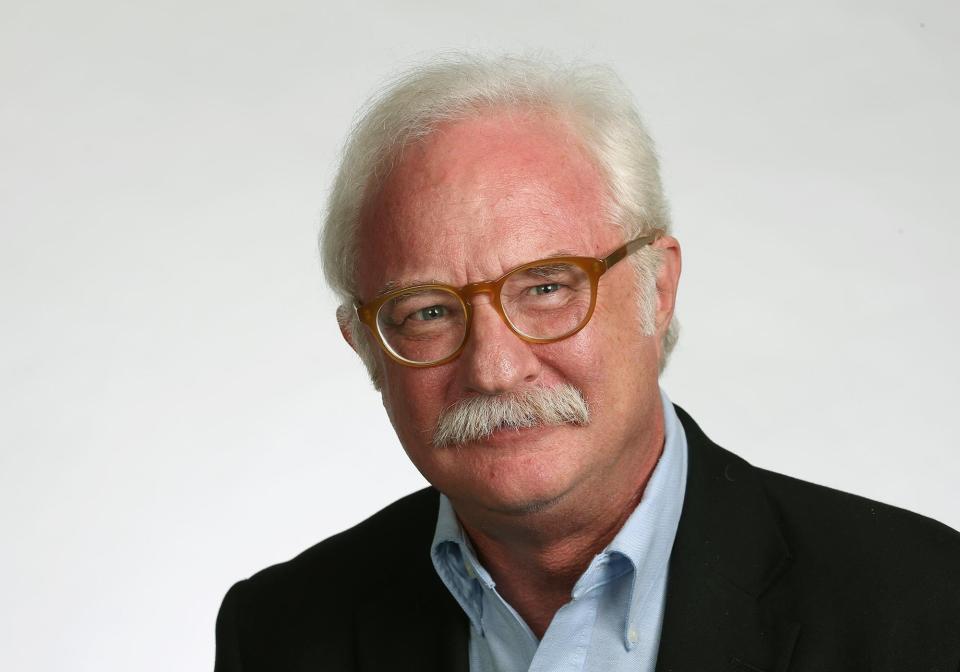Mark Lane: Legislators want party labels in school board elections
- Oops!Something went wrong.Please try again later.
The Florida Legislature’s drive to restrict what local governments can do and its zeal for controlling what’s taught in schools are coming together at the school board level. School boards are now the new culture war front line and public education is suffering for it.
Bills have been filed (SJR 94, HJR 31) to force local school boards to hold partisan elections. The proposals have been endorsed by Gov. Ron DeSantis and, like everything the governor wants, have enjoyed swift committee wave-through.
It’s a change that would mean independent, non-party voters — the fastest-growing sector of the Florida electorate — no longer would be allowed to vote in primaries.
Education: DeSantis to expand so-called 'Don't Say Gay' law to Florida high schools
Which books are allowed? Varied interpretations of Florida law lead to confusion at schools
Mark Lane: Book banners pull LGBT memoir from the shelves in Flagler
Under Florida’s strict closed-primary system, only Republicans can vote in Republican primaries and only Democrats in Democratic primaries. In counties with lopsided voter registration, there often isn’t a competitive general election, just a primary. In which case, only voters from one party get to choose.
But wait, there’s more. School board term limits, already set at 12 years, would be reduced to eight years under other bills moving through the House and Senate.
So, more partisan politics and less experience in running school systems. Is that what voters are demanding of school governance? I kind of doubt that.
Back in 1998, 64% of Florida voters passed a constitutional amendment to make all countywide school board elections nonpartisan. But even before that, with a whopping 75% yes vote, Volusia County voters approved a county charter amendment making school board elections nonpartisan.
As we’ve seen many times before, the Florida Legislature considers past votes on state constitutional amendments not as voter mandates but as nuisances to be worked around, redefined or flat-out repealed. If a partisan election bill passes the Legislature — which appears entirely likely — the repeal would go before Florida voters where it would need 60% of the vote.

But Florida voters tend to like nonpartisan elections. No-party-label voters are 28% of the electorate and would seem unlikely to knowingly disenfranchise themselves. But who knows? This is Florida.
Next year promises to produce a new crop of Florida school board candidates running because they think the job comes with a badge making them library cops. The governor will be endorsing several of them. But how much easier it would be for book banners to get into office if they only had to face a one-party election.
The sad part of this crusade to put people in charge in schools based on what they would prevent students from learning rather than what they would encourage students to learn is that school boards already have a hard, hard job.
These are not politicians looking to punch a ticket so they can move to the next level — the kind of politician that term limits encourage. These are most often people who care a lot about educational opportunity, school standards and their broader community.
They often stay in office a long time because they don’t want to run for anything else and there’s still a lot to learn about the job. It’s work that demands expertise, not just a few strong opinions. It takes a few budget cycles to get any feel for the labyrinth of the Florida Education Finance Program formula.
It takes a tense teacher contract negotiation round or two to understand what it costs to keep good teachers around. About 80% of school budgets are spent on staffing (your mileage may vary slightly county-to-county, year to year). This means that anyone running on “cutting the fat” is running on firing people. Nothing else makes much of a budget dent.
And Florida school boards have a harder job every time the Legislature meets. This session is seeing multiple expansions of the Don’t Say Gay Bill including one that (CS/SB 1320 ) that would allow for the immediate removal of any book that any county resident — not just parents — objects to, pending a review. Anybody from off the street gets to decide curriculum instead of teachers, administrators, librarians and school boards.
Florida schools already have seen absurd, kneejerk book removals done to placate a small number of activists or even to anticipate what they might object to. A couple of parents in a Tallahassee charter school have made that city an international laughingstock by getting a principal fired over students seeing a picture of Michelangelo’s David. Expect to see more of these excesses after the probable passage of a bill that would hand every would-be hometown censor a hall monitor sash.
I don’t know why anyone would want to be a Florida school board member in this environment. Requiring them also to be local political party activists promises to shrink the pool further.
Mark Lane is a News-Journal columnist. His email is mlanewrites@gmail.com.
This article originally appeared on The Daytona Beach News-Journal: Mark Lane: Legislators want party labels in school board elections

